PPC performance doesn’t hinge on spend.
It hinges on how well that spend is analyzed, understood, and optimized over time.
Effective PPC analysis requires a structured approach to identifying wasted budget, understanding conversion efficiency, and aligning performance with business outcomes. It’s not just about what happened, but why and what to do next.
This guide breaks down the core components of PPC analysis, from frameworks and tools to review cadences and common pitfalls. Whether you're scaling campaigns or refining strategy, it provides a foundation for more accountable, data-driven decision-making.
Understanding PPC Analysis
Before diving into frameworks, metrics, and tools, let's clarify what PPC analysis is and why it’s necessary. A clear understanding of its role helps ensure analysis leads to decisions that improve outcomes, not just track activity.
What is PPC analysis?
Advanced PPC analysis integrates platform data with backend systems, such as CRM or analytics tools, to understand the full impact of paid traffic on qualified pipeline, sales velocity, or customer acquisition cost.
Overall, the goal is to analyze data in context, across campaigns, audiences, devices, keywords, and ad creatives, to enable strategic decisions about budget allocation, targeting adjustments, and creative testing.
Importance of PPC analysis in digital marketing
In complex media environments, bid strategies and automation alone aren’t enough.
Without structured analysis, it’s easy to overvalue branded terms, underreport assisted conversions, or misread platform-optimized campaigns, leading to poor budget allocation and inflated channel performance.
It also plays a key role in evaluating automation strategies.
Teams using tROAS, Max Conversions, or value-based bidding need a framework for measuring whether platform recommendations are aligned with actual business outcomes, not just conversion volume.
Importantly, PPC analysis creates a feedback loop between upper-funnel media performance and lower-funnel business results. By reconciling platform-reported conversions with backend systems like CRM or CDP, advertisers can distinguish between high-CTR traffic that converts and traffic that inflates without impact.
Over time, this approach to ad performance analysis turns reactive optimizations into a repeatable strategy that supports sustainable growth.
Key Metrics in PPC Analysis
PPC performance can't be evaluated in isolation, metrics must be analyzed in relation to each other, campaign goals, and platform behavior. While each ad platform has its nuances, the following metrics are foundational for assessing performance across all major channels.
Click-Through Rate (CTR)
CTR = clicks ÷ impressions
CTR measures the percentage of impressions that result in clicks, making it a key indicator of how well your ads resonate with your target audience. It reflects the alignment between ad messaging, creative, and user intent.
Low CTR often signals misaligned messaging, poor keyword research, or ad fatigue. High CTR, on the other hand, isn’t always a win—especially if it leads to low-quality traffic or inflated costs without downstream results.
CTR is also a proxy for your competitive position in the auction. When paired with impression share and top-of-page rate, CTR helps reveal whether low engagement is due to creative fatigue, increased competition, or reduced visibility.
For example, a declining CTR with stable impression share may indicate creative issues, while a drop in both suggests you’re losing auction share to more competitive bids or higher-quality ads.
Cost-Per-Click (CPC)
CPC = Total Advertising Cost / Number of Clicks
CPC reveals the actual price paid for each click, influenced by bid strategy, competition, and Quality Score. It’s a direct input into customer acquisition cost (CAC) and a useful signal for auction pressure.
Rising CPCs without a corresponding lift in conversion quality can indicate inefficient bidding, over-segmentation, or platform-side optimization issues.
Segment CPC trends by audience, match type, and placement to spot where you’re overpaying for underperforming traffic.
Conversion Rate (CR)
Conversion rate measures the percentage of clicks that result in a defined action—such as form fills, purchases, sign-ups, or qualified leads. It's a core indicator of post-click performance and reveals how effectively your landing page experience, offer, and targeting work together to drive meaningful outcomes.
Quality Score
Quality Score, unique to Google Ads, is a diagnostic metric that impacts both ad rank and CPC. It combines expected CTR, ad relevance, and landing page experience to estimate ad quality.
While not directly controllable, improving Quality Score can reduce CPC and increase impression share over time. Use it as a directional benchmark, especially when testing creative, keyword alignment, or landing page variants.
Return on Ad Spend (ROAS)
ROAS = Revenue Attributable to Ads / Cost of Ads
ROAS is the ultimate efficiency metric, tying revenue to media spend.
Effective ROAS analysis requires more than reading platform-reported numbers.
It involves segmenting by product type, funnel stage, geo, and device to understand where budget delivers the highest margin or customer lifetime value. High ROAS in low-volume segments might not scale, while low ROAS in high-volume campaigns may still drive valuable top-of-funnel activity.
Platform ROAS is also limited by attribution logic.
Finally, ROAS should be analyzed in the context of business goals.
A break-even ROAS might be acceptable for acquisition campaigns, while retargeting or brand terms should meet much higher efficiency thresholds. Setting ROAS targets by campaign type ensures you're optimizing toward outcomes that align with channel purpose and margin expectations.
Framework and Tools for Effective PPC Analysis
PPC analysis requires a consistent framework for reviewing the data, the right tools to surface insights, and a clear process for interpreting what the numbers actually mean.
Step-by-step framework for evaluating PPC reports
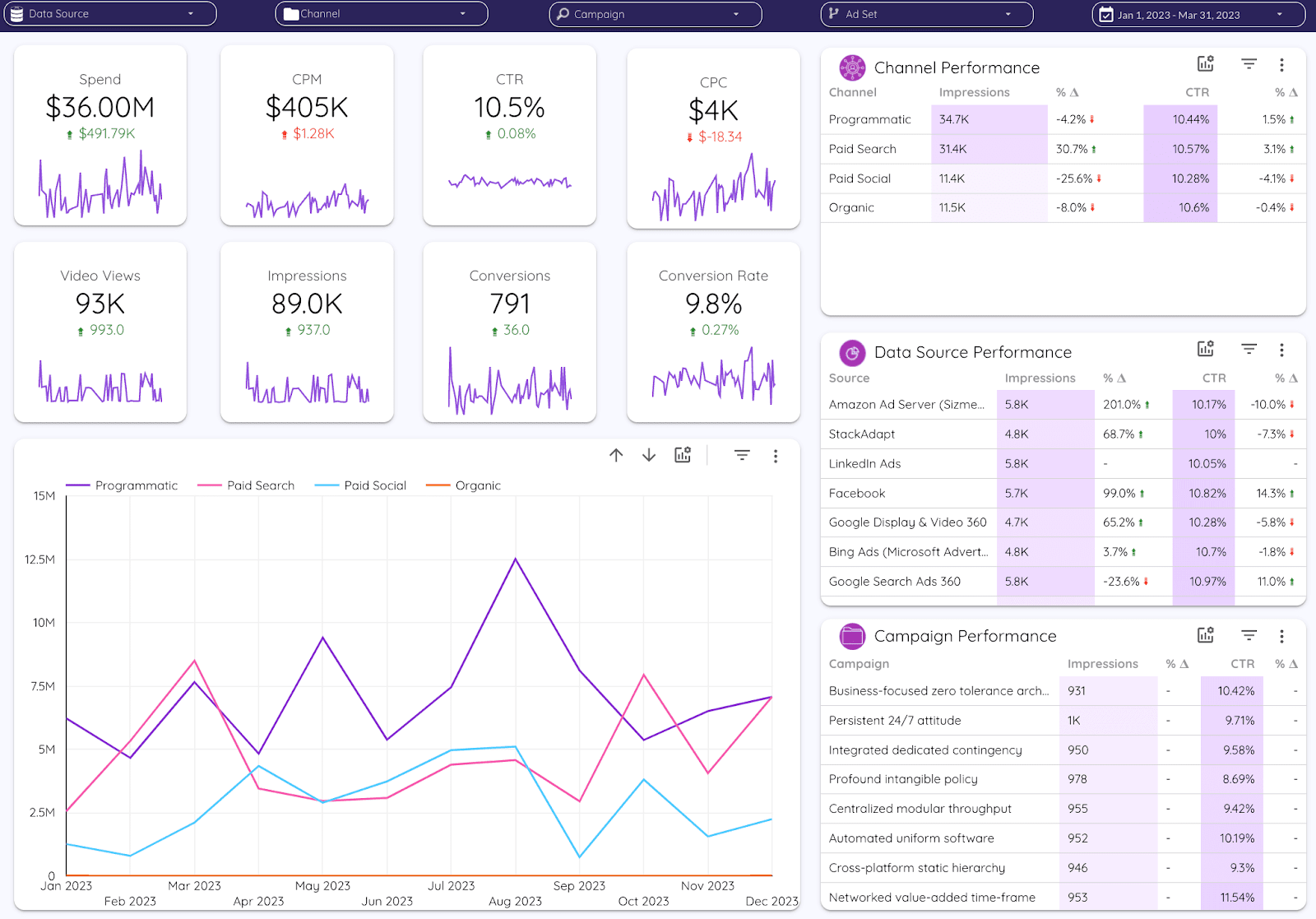
Evaluating PPC performance should follow a top-down and segmented approach—one that ties tactical data to strategic business outcomes.
- Start with account-level and campaign-level trends. Begin by reviewing spend, clicks, CTR, CPC, and conversions across campaigns. Look for directional shifts week-over-week or month-over-month, but avoid reacting to single-period variances without trend context. Flag any significant deltas for deeper analysis.
- Segment by audience, device, and geography. Once macro trends are understood, break performance down by key dimensions. Evaluate which audience lists, device types, or locations are driving positive or negative variance. This reveals areas where budget may be overperforming or where targeting needs adjustment.
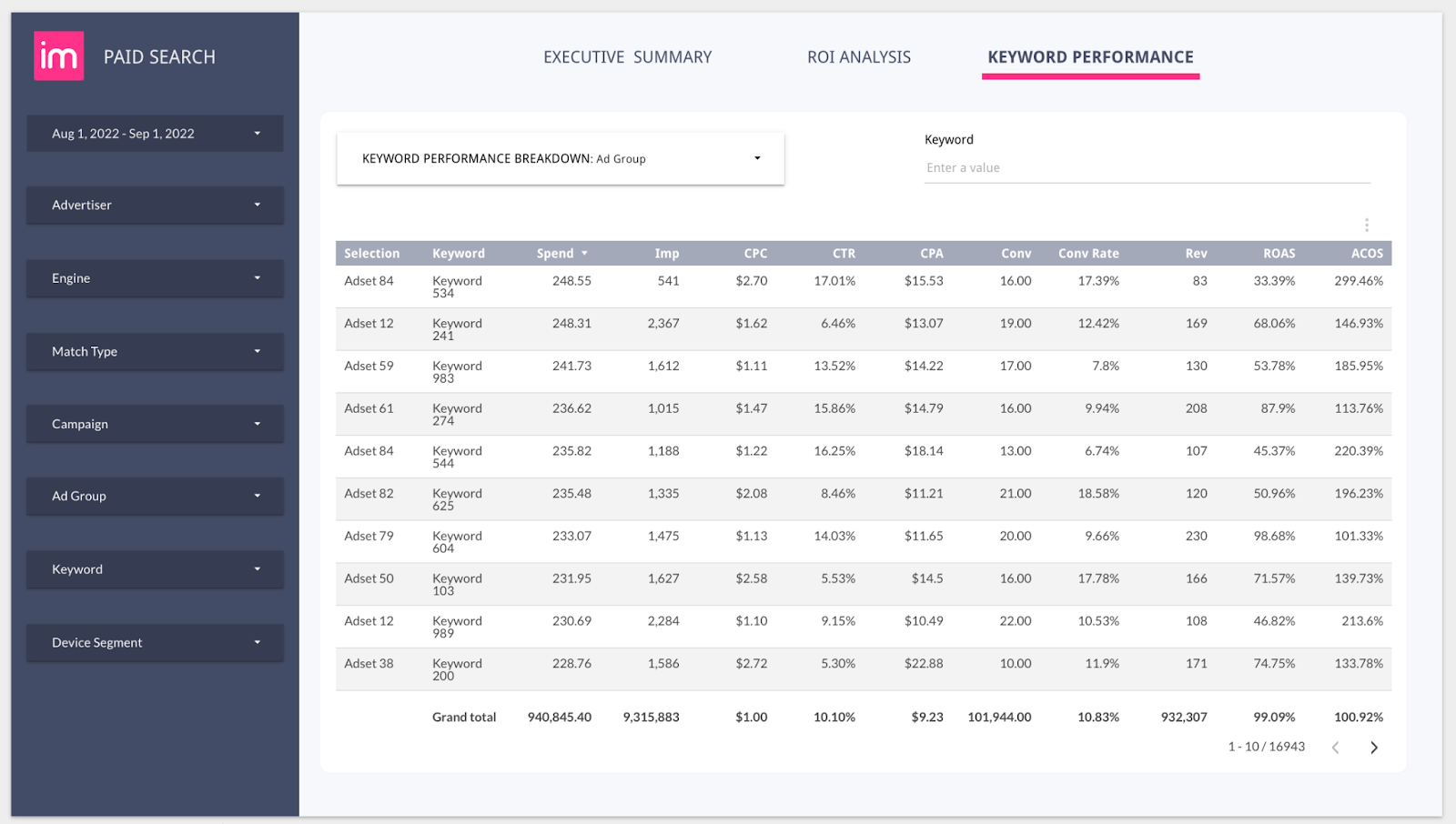
- Analyze keyword and query-level performance. In search campaigns, keyword-level and search term performance offer critical insight into intent and efficiency. Review match type breakdowns, search query relevance, and search impression share to understand how you're competing and where you’re wasting spend.
- Evaluate funnel alignment and conversion efficiency. Match each campaign’s intent with the appropriate KPI. Prospecting campaigns should be judged on engagement and assisted conversions, while retargeting and branded campaigns should meet stricter CPA or ROAS goals. Evaluate conversion rates in context of landing page experience and user path complexity.
- Benchmark with auction insights and impression share. Use platform-specific data, like Google’s auction insights and impression share, to evaluate competitive positioning. A drop in CTR or impression share may reflect increased auction pressure, not necessarily creative underperformance.
- Connect campaign performance to business metrics. Close the loop by aligning campaign data with revenue, pipeline contribution, or qualified leads from downstream systems. This ensures optimizations are grounded in actual business impact, not just platform-reported conversions.
Essential tools for PPC data analysis
1. Cross-platform dashboards and custom reporting
Most teams rely on a combination of native platforms and external tools.
Google Ads, Microsoft Ads, and Meta Ads Manager provide foundational reporting, but custom analysis often requires pulling data into tools like Looker Studio, Power BI, or Tableau.
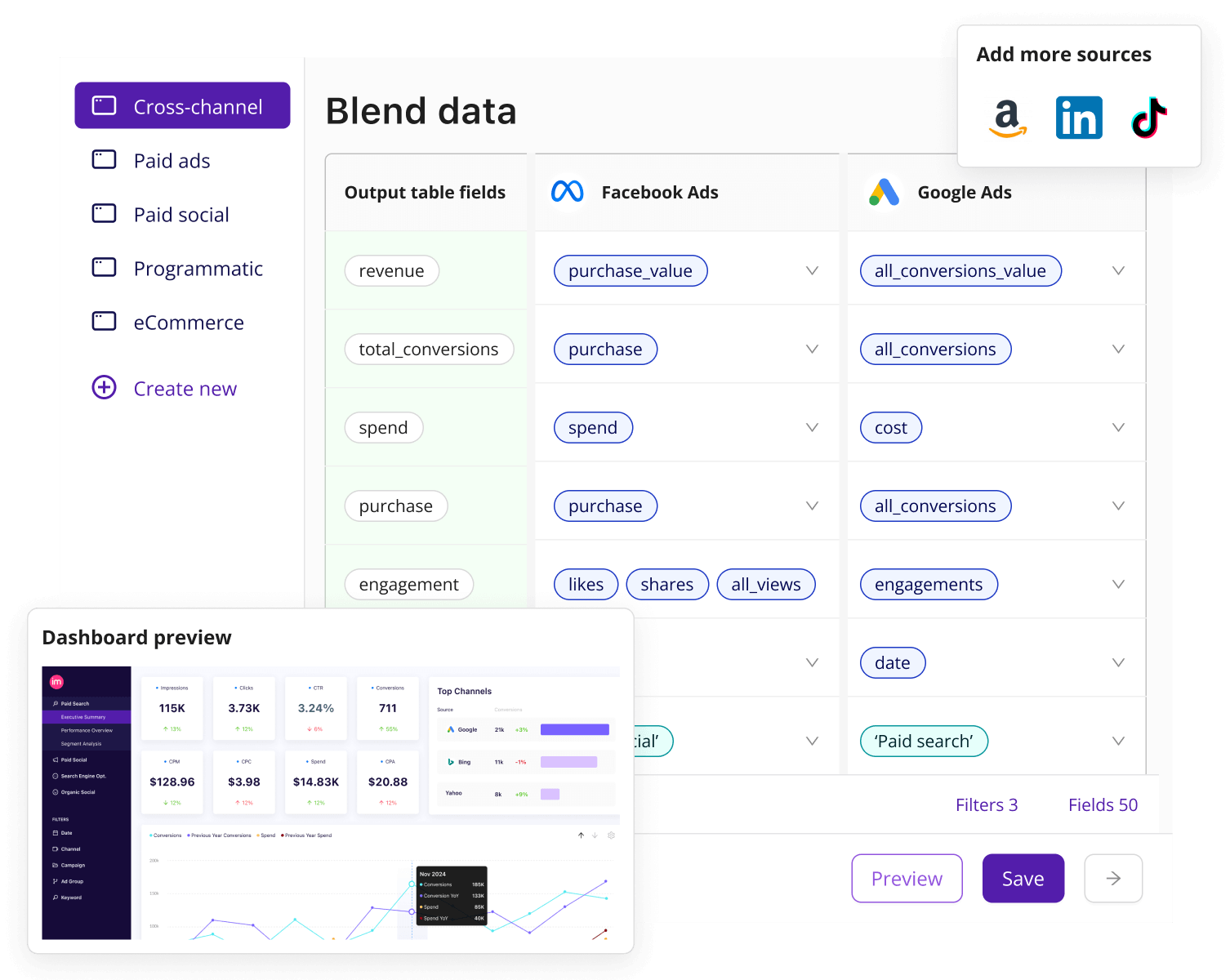
To power these dashboards, platforms like Improvado automate data extraction from over 500 marketing and ad platforms, both offline and online, normalize disparate metrics, and deliver clean datasets directly into BI tools or cloud data warehouses.
This removes the need for custom scripts or spreadsheet work, ensures metric consistency, and reduces reporting lag across teams. Provided dashboard templates help set up reporting with minimum effort and IT support.
2. Alerting systems for near real-time optimization
In high-spend environments, performance can shift in hours.
A sudden spike in CPC or a drop in conversion rate can burn through budgets or stall lead flow before anyone notices. Relying on manual checks or weekly reports often means catching issues too late to recover lost efficiency.
Near-real time alerting helps prevent this.
By proactively flagging anomalies, such as pacing deviations, conversion drops, or underdelivery, teams can respond before small issues turn into major performance gaps. This is especially valuable when running dozens or hundreds of campaigns across platforms, regions, brands, or clients.
3. AI-generated period-over-period reports
Routine campaign performance comparisons, week-over-week, month-over-month, or campaign-over-campaign, can quickly become time-consuming.
AI-generated reports simplify this process by identifying significant shifts in metrics like spend, CPC, CVR, and ROAS without manual slicing.
These reports are configured based on business context and automatically flag areas needing attention. Delivered via email or embedded in your analytics platform, they act as a daily or weekly pulse check, giving stakeholders visibility without requiring deep dive sessions.
This is particularly useful in fast-moving environments where spend thresholds or lead quality can change rapidly and require proactive adjustment.
4. AI agents for on-demand analysis
AI agents are transforming how performance teams access and interact with PPC data.
Rather than relying on static dashboards or waiting for analyst support, users can run ad-hoc queries in plain language, asking questions like — “Which campaigns had the highest drop in CVR last week?” or “Compare ROAS by geo for prospecting vs. retargeting.”
AI agents connect directly to your centralized marketing dataset and return answers instantly, often with visual context. They understand campaign structures, metric hierarchies, and historical baselines.
By making PPC analysis more accessible, AI agents reduce operational friction, speed up decision cycles, and empower non-technical marketers to explore performance insights independently.
How to accurately interpret PPC report insights
Raw metrics alone don’t tell the full story. Interpreting PPC data effectively requires linking performance signals to real business impact and knowing where to look when something shifts.
Below are key areas where expert interpretation turns reporting into actionable strategy.
1. Identifying wasted spend
One of the most overlooked signals in PPC reporting is non-converting spend.
Filtering for campaigns, ad groups, or keywords with high spend but no conversions or weak post-click engagement helps surface areas draining budget.
One technique is to analyze non-converting spend by search query within broad or phrase match keywords.
Export queries with more than X clicks and zero conversions over a set time frame (for example, 30 or 60 days), then aggregate cost. Often, 10–20% of total spend is tied to irrelevant or low-intent queries that bypass initial negative keyword filters.
2. Improving bid efficiency and budget allocation
Effective PPC analysis requires moving beyond aggregate metrics to identify how budget performs across intent tiers, geographies, devices, and audience segments.
One approach is to calculate marginal ROAS, how each additional dollar spent impacts return, rather than relying on blended averages. This highlights where spend can be scaled profitably and where diminishing returns begin.
For example, campaigns with consistent ROAS but rising CPC may be approaching saturation, signaling the need to cap bids or redistribute budget to higher-efficiency segments.
For more advanced strategies, consider layering in conversion lag data and assisted conversion insights to better attribute value across funnel stages. This ensures that bid and budget decisions aren’t optimized solely for short-term, last-click outcomes.
3. Spotting audience-target mismatches
A practical way to identify mismatch is to analyze conversion rate and ROAS by audience segment, side-by-side with engagement metrics like CTR and bounce rate.
For example, a high CTR but low conversion rate in an in-market segment may suggest your offer or landing page doesn't align with actual user intent. Conversely, low CTR with strong post-click performance could indicate the right audience but ineffective messaging, often fixable through ad creative changes rather than retargeting logic.
In platforms like Google Ads or Meta, use observation mode (vs. targeting) to test new audiences before fully committing a budget. This allows you to compare performance across multiple segments in the same campaign without disrupting structure.
4. Detecting channel overlap and cannibalization
When multiple channels or campaigns target the same audience or intent signals, performance can appear strong in isolation but result in duplicated costs, inflated CPAs, and distorted attribution.
To detect this, analyze conversion paths and assisted conversion data across platforms.
- Look for repeated patterns where users are touched by multiple campaigns before converting.
- Use attribution modeling or CRM-mapped journeys to quantify how often conversions are double-counted or misattributed. For instance, a lead may be claimed by both Meta retargeting and Google branded search, creating the illusion of two successful campaigns when only one was needed.
Platforms rarely detect internal cannibalization by default, it’s up to analysts to audit structure and cross-reference performance. Resolving overlap can improve marginal ROAS, reduce wasted impressions, and provide clearer insights into which channels actually drive results.
Actionable Tactics to Improve PPC Campaigns
A well-executed analysis is only as valuable as the action it drives. Once performance insights are clear, the next step is to apply targeted changes that improve efficiency, scale what works, and eliminate what doesn't.
Proven strategies to optimize your PPC results
- Shift from campaign-level to segment-level budget allocation. Instead of optimizing at the campaign level, break down spend and performance by audience, match type, geo, or funnel stage. Shift budget from underperforming segments to those with stronger marginal ROAS or pipeline contribution. Use impression share and cost-per-conversion trends to guide reallocation.
- Tighten search intent alignment through query mapping. Audit search terms regularly and map queries to intent tiers. Build dedicated campaigns around top-performing queries using exact match to control spend and reduce leakage. Apply negative keywords to prevent overlap across branded, competitor, and generic campaigns.
- Audit conversion lag and attribution timelines. Short conversion windows can bias optimization. Extend lookback windows where appropriate and incorporate offline conversion tracking or CRM integration to capture delayed or assisted conversions. Reassess ROAS and CPA thresholds based on actual conversion cycles.
- Improve bidding precision using marginal ROI analysis. Avoid blanket bid adjustments. Instead, calculate marginal ROI or marginal CPA at the ad group or keyword level. This helps identify where to scale bids without diluting efficiency, particularly in saturated markets or during aggressive scaling.
- Use campaign exclusions to prevent cannibalization. In omnichannel setups, use exclusions to prevent overlapping audiences from being targeted by multiple campaigns. This improves budget efficiency and provides cleaner attribution paths.
- Incorporate LTV and profit margin into campaign goals. Instead of optimizing toward blended ROAS or front-end CPA alone, factor in product margin or customer lifetime value. Shift budgets toward segments that may appear expensive short-term but deliver higher retention or cross-sell potential over time.
- Test bid automation vs. manual control in parallel. Don’t assume automated strategies outperform manual. Run A/B tests between tROAS or Max Conversions and fixed-bid strategies on similar campaigns. Monitor volatility and performance during transitions, especially with limited conversion volume or inconsistent data quality.
Post-analysis checklist: Ensuring continuous improvement
To drive sustainable performance, teams need a structured post-analysis process that translates findings into action, tracks impact, and creates feedback loops for ongoing refinement.
Below is a checklist to embed continuous improvement into your PPC workflow.
- Document hypotheses, decisions, and changes. Create a changelog or optimization log for every significant action taken, whether pausing a campaign, adjusting a bid strategy, or excluding a placement. Include the performance insight that led to the decision, the change itself, and the expected outcome.
- Tag campaigns and segments for analysis continuity. Use consistent naming conventions and campaign-level labels (for example, “TOFU_AudienceTest_Q3”) to track tests, seasonal pushes, or strategic initiatives. This makes it easier to compare performance over time and filter reports by strategic intent, not just ad platform structure.
- Set metric-specific thresholds to trigger re-evaluation. Define clear KPI thresholds that require action—for example, “CPA exceeds $X for 3 consecutive days,” or “ROAS falls below target by 25% week-over-week.” Configure automated alerts to highlight these shifts without constant manual monitoring.
- Schedule recurring reviews based on campaign scale. Not all campaigns require the same cadence. High-spend or short-lifecycle campaigns may need daily checks; long-term or low-volume programs may benefit from weekly or monthly deep dives. Assign ownership for each and formalize the review cycle to avoid performance drift.
- Close the loop with post-optimization impact assessment. Every optimization should be followed by a performance review. Did the bid strategy change improve ROAS? Did audience exclusions reduce CAC without hurting volume? Attribute results back to actions taken, not just environmental changes, and use this to refine your playbook over time.
- Reassess segmentation and structure quarterly. Every few months, revisit how your campaigns are structured: audience groupings, geographic clusters, match type strategies, and budget distribution. Scaling often reveals inefficiencies or overlaps that weren’t visible earlier. A quarterly structural audit prevents long-term inefficiencies from compounding.
By embedding this checklist into your team’s workflow, you create a disciplined approach to PPC campaign management that reduces reaction time, improves accountability, and compounds performance gains over time. Continuous improvement in PPC isn't just about optimization—it's about operationalizing insights at scale.
PPC Analysis Checklists for Consistent Optimization
Maintaining performance at scale requires more than periodic deep dives. A structured cadence of daily, weekly, and monthly PPC reviews helps surface both urgent issues and longer-term trends.
Daily PPC performance monitoring
Daily reviews should focus on anomalies and pacing across high-impact campaigns. Use automated dashboards or alerting tools to flag key variances in spend, conversions, ROAS, and CPC.
- Start by validating spend pacing against daily budget allocations. Look for campaigns approaching caps too early in the day or underspending despite active budgets. This can signal issues with bidding strategy, audience size, or disapproved assets limiting reach.
- Next, scan for performance anomalies across core KPIs, particularly sharp day-over-day changes in CPC, CTR, impression share, or conversion rate. Flag fluctuations greater than 20–30%, especially when paired with drops in conversions or return metrics. These shifts often point to platform-side auction volatility, broken tracking, or unintended structural changes (e.g., bid caps, excluded audiences).
- Check for disapproved ads, policy violations, or sudden impression loss, especially in platforms like Google Ads or Meta, where changes in creative status can halt delivery without direct notification.
- Also review top-performing and recently launched PPC campaigns. Confirm they’re scaling as expected and not encountering limits tied to audience reach, creative fatigue, or underbidding.
Weekly PPC audits and quick wins
Weekly audits provide space to investigate patterns and implement low-effort, high-impact optimizations.
- Begin by reviewing query-level performance in search campaigns. Group search terms by match type, intent tier, and conversion performance. Flag search queries with high spend and low conversion volume over a 7–14 day window. Add negative keywords to eliminate waste and reallocate spend toward converting queries with scalable intent.
- Analyze ad creative performance across ad groups or asset groups. Identify underperforming headlines, descriptions, or image assets using impression-weighted CTR or asset contribution score. Refresh creative variants with low engagement, especially in retargeting or brand campaigns where frequency is high.
- Review non-converting spend concentration. Aggregate spend across keywords, placements, or ad sets with no conversions in the last 7–14 days and flag for pause or restructure. This alone can reclaim a significant percentage of wasted budget without affecting volume.
- Validate budget distribution across funnel stages and campaign objectives. Ensure prospecting campaigns aren’t underfunded relative to remarketing or branded campaigns, especially if top-of-funnel volume is slowing. Shift budget to campaigns with rising marginal ROAS or scaling potential.
Monthly PPC review and strategic adjustments
The monthly review is where tactical adjustments give way to strategic planning.
- Start by analyzing month-over-month performance trends across key KPIs—ROAS, CPA, CR, CTR, and spend. Segment these metrics by campaign type, funnel stage, and platform to identify where gains or losses are occurring.
- Evaluate budget efficiency across segments. Compare how each campaign or audience performed relative to its share of total spend. This helps identify overspending in saturated or low-return segments and opportunities to scale in high-efficiency pockets.
- Review campaign structure for scalability and control. Consider consolidating low-volume ad groups or breaking out high-performing segments for more precise control. Audit naming conventions, labels, and tracking parameters to ensure reporting continuity and automation compatibility.
- Conduct a channel overlap and attribution audit. Review assisted conversion paths across platforms and campaigns. Check for cannibalization, compare platform-attributed conversions against backend systems to identify discrepancies and recalibrate targets or attribution logic accordingly.
Common Pitfalls and How to Avoid Them
Even experienced teams can fall into patterns that limit performance. Below are common pitfalls in PPC analysis and execution and how to avoid them with structured processes and smarter workflows.
Over-relying on platform-reported conversions
Platform-reported conversions are useful, but often present an incomplete or biased view of performance. These platforms typically apply their own attribution models and often over-credit themselves for conversions, especially in cross-channel user journeys.
For example, branded search campaigns may appear to drive strong ROAS in-platform, but a significant portion of those conversions would have occurred organically or were already influenced by upper-funnel channels. Similarly, Meta may credit retargeting campaigns for conversions that originated from paid search, influencer content, or email.
Relying solely on these in-platform metrics can lead to over-investment in lower-funnel or cannibalizing tactics while underfunding channels that actually generate incremental value.
Letting automation run unchecked
Automated bidding strategies and campaign types can drive scale but they’re not set-and-forget. Monitor delivery patterns, search term visibility, and CPC volatility. Layer in negative keywords, custom audiences, and campaign exclusions to regain control.
Neglecting creative fatigue
Creative fatigue is one of the most common and underdiagnosed causes of declining PPC performance.
The issue often goes unnoticed because top-level campaign metrics can remain stable for a time, masking underlying drops in audience responsiveness. Over time, this leads to rising CPAs, inefficient spend, and wasted impressions on audiences that have tuned out.
To catch this early, monitor asset-level contribution metrics (for example, in Meta's asset breakdown or Google's asset performance ratings) and look for declining CTR or conversion rate across high-frequency segments.
Ignoring conversion lag and delayed impact
Short attribution windows can lead to premature pausing of campaigns or misjudging performance. Understand your average conversion lag and set proper lookback windows before evaluating success. For longer sales cycles, incorporate CRM or pipeline data into the evaluation.
Lacking a consistent review cadence
Without a defined cadence for daily, weekly, and monthly analysis, issues go undetected, campaigns drift from strategic objectives, and optimization becomes reactive rather than systematic.
Teams that review data only when performance drops often find themselves addressing symptoms instead of root causes. For example, a spike in CPA may result in bid or budget cuts without understanding if the issue originated from auction pressure, targeting changes, or creative fatigue introduced days earlier.
Next Steps
PPC analysis is a disciplined process of identifying inefficiencies, testing with intent, and aligning paid media with business outcomes. Done right, it turns ad platforms from cost centers into predictable growth engines.
To operate at scale, performance teams need more than fragmented dashboards or manual audits. They need a system that supports real-time visibility, cross-channel attribution, and proactive optimization workflows.
Improvado helps unify paid media data across platforms, automate performance monitoring, and surface actionable insights—whether through custom dashboards, AI-generated reports, or alerting systems. For teams looking to streamline PPC analysis and take action faster, book a demo to see how Improvado can fit into your performance stack.
.png)

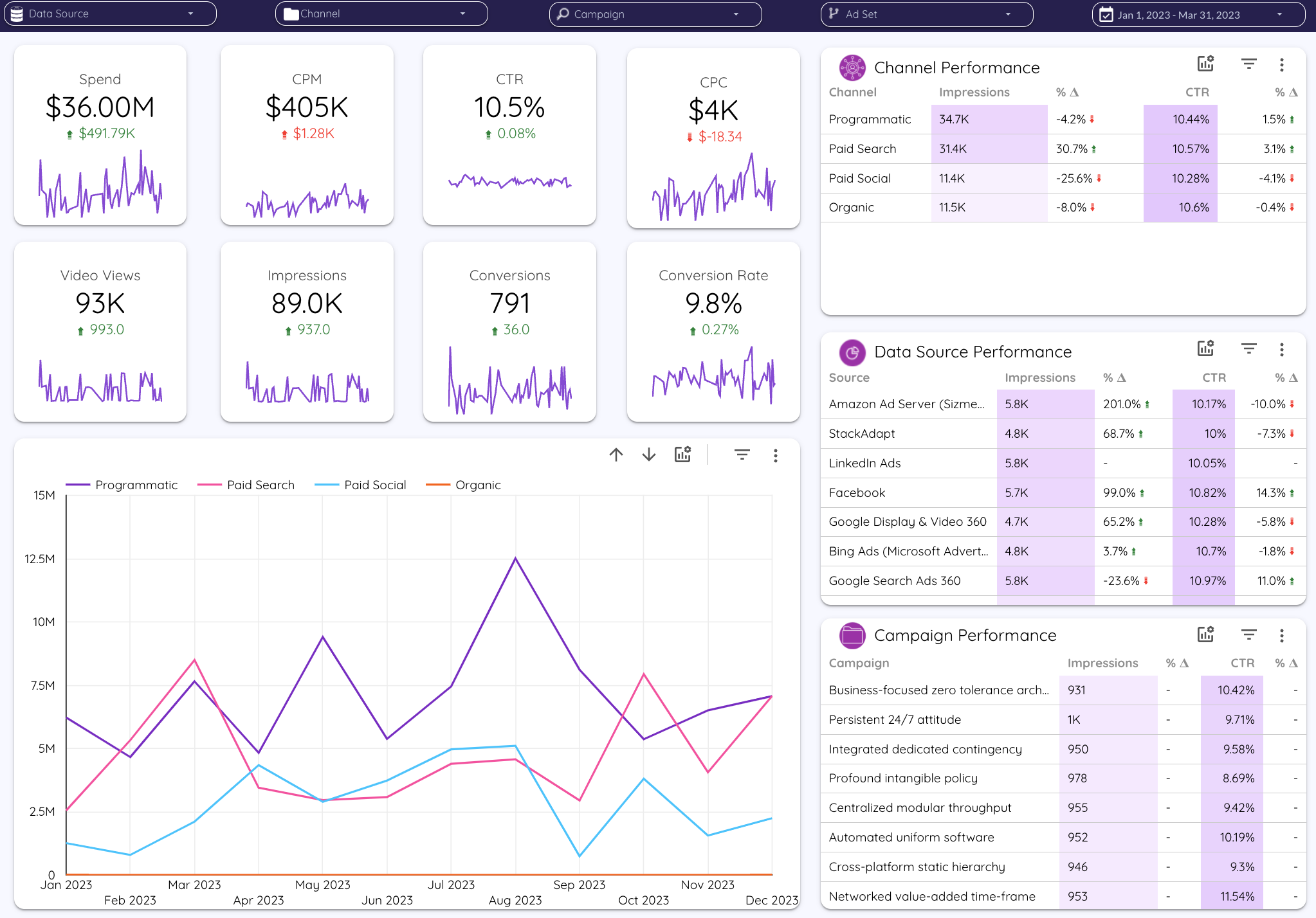


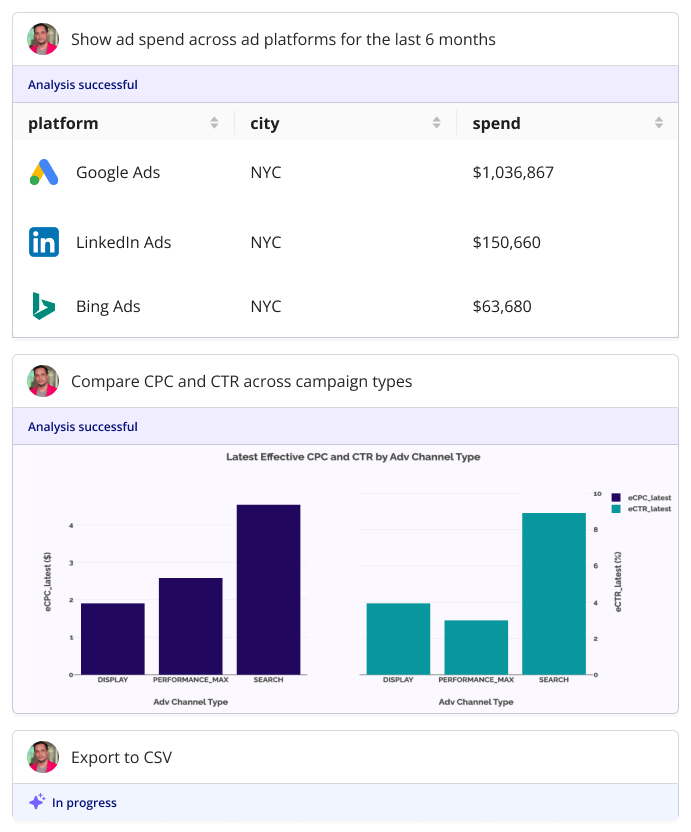
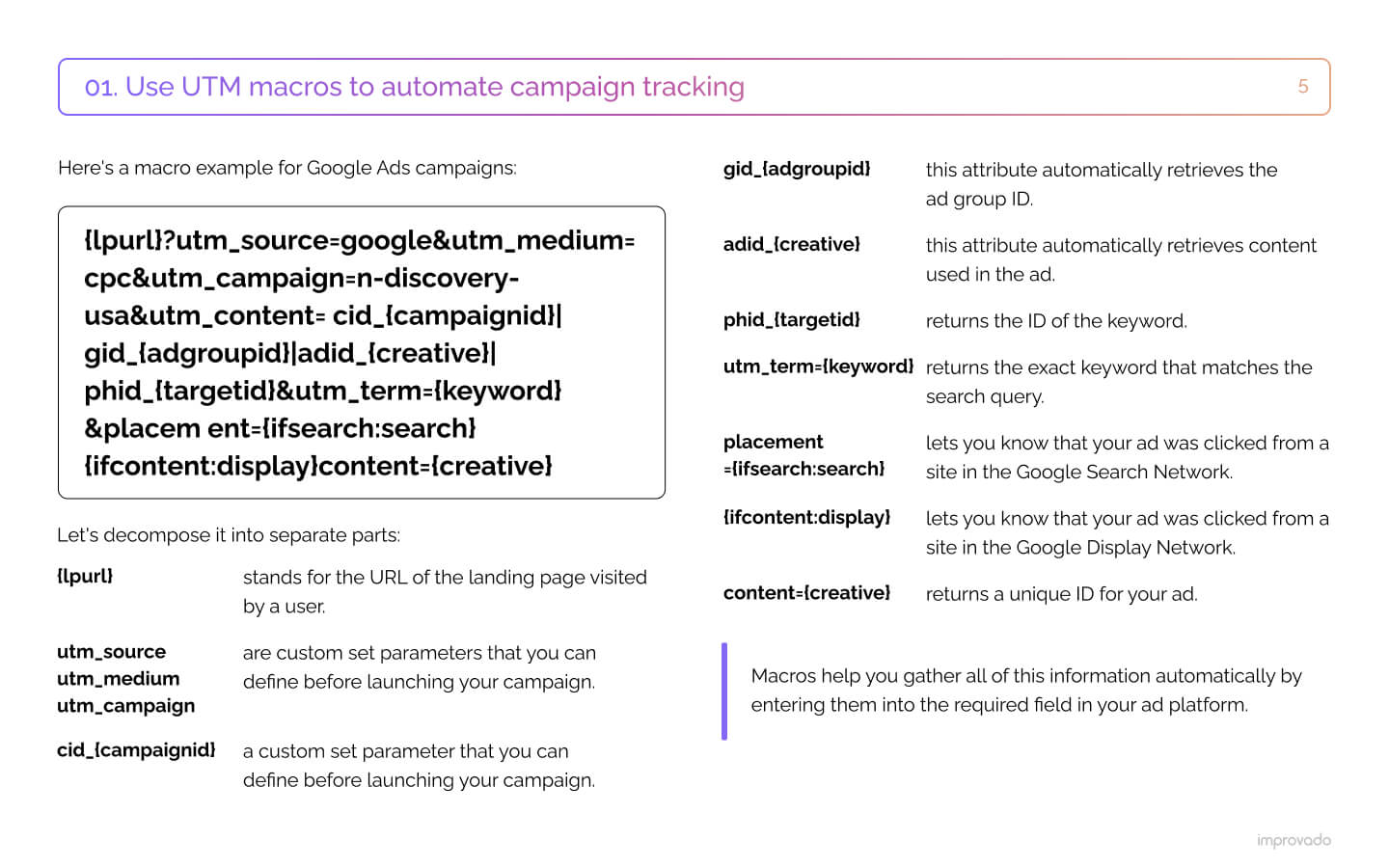


.png)
